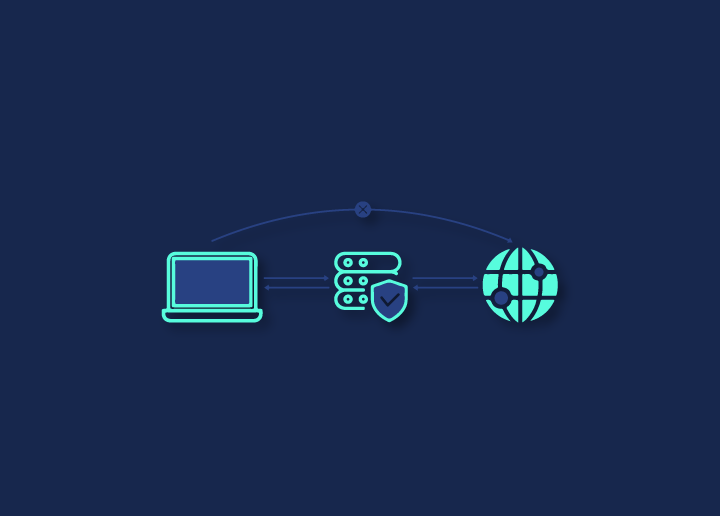In the Internet age, proxy servers play an important role in many fields. Whether it is an individual user or an enterprise, you may need to use a proxy to protect your privacy and data security. When choosing a proxy service, the level of anonymity is an important consideration. This article will introduce the anonymity level of the proxy and explain why anonymity is very important when using a proxy.

I. The anonymity level of the proxy
The anonymity level of the proxy is usually divided into three types: transparent proxy, anonymous proxy, and high-anonymity proxy. They differ in hiding the client's real IP address and other identity information.
1. Transparent proxy:
Transparent proxy is also called ordinary proxy, which is characterized by not modifying the requested information during transmission. With a transparent proxy, the target website can obtain the client's real IP address and other related information. This means that transparent proxy provides lower anonymity, and the client's real identity and location are easily identified.
2. Anonymous proxy:
Anonymous proxy hides the client's real IP address when transmitting the request, but still passes some other information, such as HTTP headers. Although the target website cannot directly identify the client's real IP address, it can still detect that a proxy is used. Therefore, anonymous proxy provides higher anonymity than transparent proxy, but there are still certain risks.
3. High Anonymous Proxy:
High Anonymous Proxy is also called Deep Anonymous Proxy, which completely hides the client's real IP address and other identity information when transmitting requests. With a high anonymous proxy, the target website cannot recognize that the client uses a proxy, thus providing the highest level of anonymity and privacy protection.
II. The Importance of Anonymity
On the Internet, it is vital to protect personal privacy and data security. Anonymity is very important when using a proxy for the following reasons:
1. Privacy protection:
On the Internet, the user's IP address and other identity information are an important part of personal privacy. Using an anonymous proxy or a high anonymous proxy can effectively hide the user's real IP address, thereby protecting the user's privacy from illegal infringement.
2. Prevent tracking:
Many websites and advertisers track user activities by collecting users' IP addresses and browsing habits, and use them for advertising targeting and user behavior analysis. Using an anonymous proxy can prevent tracking and protect users' personal information from being abused.
3. Bypassing blocks and restrictions:
Some regions or network environments may block or restrict access to specific IP addresses. Using an anonymous proxy or a high anonymous proxy can bypass these blocks and restrictions and obtain a freer access experience.
4. Network security: Anonymous proxies and high-anonymous proxies can provide users with an additional layer of network security protection. Hiding the real IP address can reduce the risk of exposure to network attacks.
5. Competitive advantage: In business competition, companies may need to analyze and monitor competitors. Using high-anonymous proxies can help companies hide their true identities, avoid being discovered by competitors, and obtain more accurate competitive intelligence.
3. How to check the anonymity of the proxy
1. Check the IP address type: When using a proxy, first check your IP address type. Transparent proxies usually directly expose your real IP address, while anonymous proxies and high-anonymous proxies hide your real IP address.
2. Use online proxy detection tools: There are many online tools that can help you detect the anonymity of the proxy. These tools will show you the IP address you are currently using and the anonymity level of the proxy.
3. Analyze HTTP headers: Viewing the HTTP header information of the proxy request can help you understand whether the proxy will leak some key information. Transparent proxies usually reveal the real IP address in the header information, while anonymous proxies and high-anonymous proxies try to hide this information.
4. Use IP location services: Use IP location services to view the geographical location of the proxy server. If the location of the proxy server does not match your actual location, then this is a sign of an anonymous proxy or a high-anonymity proxy.
5. Check the type of proxy server:
Different types of proxy servers provide different levels of anonymity. Transparent proxies generally provide lower anonymity, anonymous proxies provide medium levels of anonymity, and high-anonymity proxies provide the highest level of anonymity.
6. Test website access:
Use a proxy to access some restricted websites and observe whether you can successfully access them. If the proxy is recognized and restricted by the website, then its anonymity may be low.
Summary:
Anonymity is crucial for proxy users. Different levels of anonymous proxies provide different degrees of privacy protection, and users should choose the appropriate proxy service according to their specific needs and usage scenarios. Whether it is an individual user or an enterprise, by using anonymous proxies or high-anonymity proxies, you can achieve a higher level of privacy protection and secure access experience on the Internet.
Related Recommendations
- Principle and practical application of dynamic IP proxy technology
- What should I pay attention to when using the HTTP protocol to access websites abroad?
- Buy overseas IP in limited regions to unlock global vision!
- What are the methods of web testing? How can residential agents assist?
- Static Residential IP Buying Guide: Precautions and Tips for Avoiding Stacks
- Big data practitioners must see it. What are the common crawlers?
- How do foreign questionnaires make money? Do you need to use overseas residential IP?
- Do you need native IP to do cross-border e-commerce?
- How to operate a U.S. TikTok store with U.S. residential IP?
- Cross-border e-commerce companies have already used fingerprint browsers. Do they still need to use exclusive IP?

